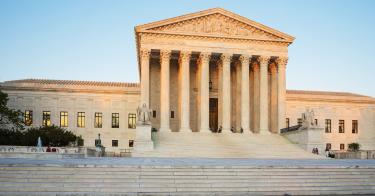Now that we know that Judge Brett Kavanaugh has been nominated to replace retiring Supreme Court Justice Anthony Kennedy, here’s what happens next.
First, the nomination is referred to the Senate Judiciary Committee. Then, the committee will hold confirmation hearings.
Since Justice Kennedy’s appointment three decades ago, those confirmation hearings have been held, on average, 45 days after a nomination. Typically, confirmation hearings last three to four days. Then, a week or two later, the committee meets to debate and vote on whether to send the nomination to the full Senate.
The Senate confirmation vote usually occurs about seven days later. All together, then, the Senate process takes an average of 71 days from nomination to confirmation.
For Judge Kavanaugh, the process could take longer. Senate Democrats may drag out the process by refusing to cooperate in deciding on the length of floor debate or in scheduling a confirmation vote.
Senate rules used to require a supermajority of 60 votes to end debate, or invoke cloture. Since April 2017, however, only a simple majority has been required to end debate on a Supreme Court nomination. If Judge Kavanaugh’s opponents wish to defeat the nomination, they will have to do it the old-fashioned way: by persuading a majority of senators to vote against his confirmation.
Early indications are that they will try to do that by depicting the judiciary as a powerful, political body — one that exists not to apply the laws as written but to produce certain results, serve certain interests, and advance certain agendas. Progressives now insist that the Senate should reject any nominee who does not promise to embrace their policy positions on specific issues.
A June 27 statement from the progressive Alliance for Justice, for example, said “the future of health care, the environment, women’s rights, workers’ rights, LGBTQ rights, racial equality and more is literally on the line as President Trump ponders Justice Kennedy’s successor.” At a rally the next day, Sen. Elizabeth Warren, D-Mass., said “50 years of hard work” was on the line, beginning with abortion rights but also including voting rights, workers’ rights, and “environmental rights.” She said: “What’s at stake? The future of America is at stake.”
The notion that the “future of America” is in the hands of a single judge, or a single court, is a radical departure from America’s past. America’s founders designed our system of government so that the future of our country is in the hands of the American people and those they elect. This requires, as President George Washington said in his 1796 farewell address, that the people stay in control of the Constitution. They cannot do so if judges take that control from them.
Politicians on the left, by contrast, believe that judges decide cases by using their personal views to take sides.
In any judicial nomination, the real issue is not whose side the nominee will be on, but whether judges should take sides at all. Demanding to know how a nominee would decide future cases is the opposite not only of fairness, but of the oath that judges take to “do equal right to the poor and to the rich, and ... faithfully and impartially discharge and perform all the duties incumbent upon me.”
So observe and listen to how Judge Kavanaugh’s nomination is debated in the weeks ahead. All judges should be fair, impartial, and 100 percent faithful to the Constitution. But some think they should be able to impose their will and rearrange everyone’s rights. When senators cast their votes, we will see on which side of this defining line they stand.
This piece originally appeared in the Providence Journal



